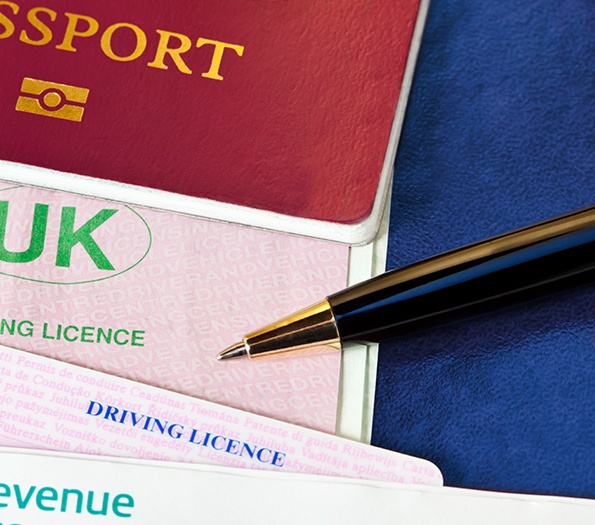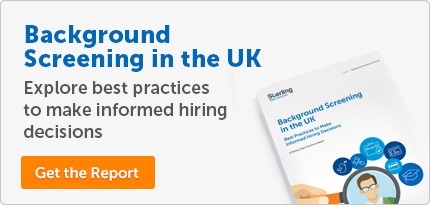February 27th, 2018 | Sterling
What are Employer’s Obligations Regarding Right to Work Checks?

In the UK, all employers are required by law to check to see if their employees have the right to work in the UK. Failure to ensure your employees have the right to work in the UK can lead to heavy penalties and fines. At the moment, this should be a straightforward check to perform for the majority of workers, as members of the European Union have the right to work in any EU country (with a few caveats). Brexit is likely to affect the Right to Work documentation, process and rules. Companies will need to keep an eye on the Home Office website for updates or have a third-party screening provider who is up-to-date with the changes.
An employment background check provides a detailed look at a new hire, giving organisations the insight they need to make an informed hiring decision. Sterling published “Background Screening in the UK-Best Practices to Make Informed Hiring Decisions”. The report looks at nine of the most common pre-employment checks in the UK, including Right to Work Checks. The eBook details what each check entails, explains why employers conduct each check and provides some practical considerations that may improve a company’s background screening programme.
What are Right to Work Checks?
Certain people are automatically entitled to work in the UK while others may have restrictions on their eligibility to work, how long they can work in the UK and what type of work they can do. A Right to Work Check is a check that establishes an individual’s right to work in the UK and the conditions and hours under which they are allowed to work. These checks need to be done in person, face-to-face with original required documents strictly policed by UK Border Agency. It is the employer’s role in preventing illegal working by undertaking simple checks on their employee’s eligibility to work in the UK. An employer is required to complete the check before employment, check the correct combination of approved documents and perform follow-up checks for employees with time-limited permission to work in the UK.
Employer’s Obligations Regarding Right to Work Checks
Every employer has a legal obligation to establish and record the right to work of all employees and contractors. Getting it wrong is a significant risk. Failing to properly carry out these checks can result in fines up to £20,000 per incident and/or possible imprisonment.
By following a three-step Right to Work check process before an applicant gets hired, a company will have a statutory excuse against liability for a civil penalty. The UK Home Office has set specific rules for Right to Work Checks that an organisation must follow before employing an applicant. The rules state that a company must:
- See the applicant’s original documents
- Check that the documents are valid with the applicant present
- Make and keep copies of the documents and record the date you made the check
Tips for Checking the Right to Work Documents
When checking the documents, a company must thoroughly examine the Right to Work documents on two different lists: List A and List B. The Home Office has published the Right to Work Guide to Acceptable Documents which provides information about the documents which are acceptable for companies to check to establish someone’s right to work. List A contains documents which a business can accept for a person who has permanent right to work in the UK. If the right to work check is done correctly before employment begins, they will establish a continuous statutory excuse for the duration of that person’s employment with no further checks needing to be conducted. List B contains documents which may be accepted by a person who has a temporary right to work in the UK. Companies will be required to conduct a follow-up check to retain the statutory excuse.
The Home Office also lists the following requirements when inspecting the documents in person:
- The documents need to be genuine, original and unchanged and belong to the person who has given them to you
- The dates for the applicant’s Right to Work in the UK haven’t expired
- Photos are the same across all documents and look like the applicant
- Dates of birth are the same across all documents
- The applicant has permission to do the type of work the company is offering (including any limitations on the number of hours they can work
Right to Work Checks as Part of a Comprehensive Background Screening Programme
Right to Work documentation verification as part of a comprehensive background screening programme helps to guide employers on best practice, as well as supplement their own investigations to ensure their employees have the legal right to work in the UK. Document verification supports a company’s statutory excuse by performing a more thorough verification of the documents. It ensures the right combination of documents are being examined and highlights any restrictions and expiry date as well as checking reference numbers against official algorithms and databases to ensure their validity. It is important to remember that by law, the liability ultimately lies with the employer and not with any third-party acting on their behalf.
Steve Smith of Sterling and Ian Robinson of Fragoman Global will be discussing three simple steps to ensure that Right to Work Checks are compliant despite complex hiring processes and impending Brexit complications at the In-House Recruitment Expo in London on Tuesday, February 27th.
Companies need to determine which type of background screening check is the most important to protect their employees and businesses. Download a complimentary copy of our “Background Screening in the UK-Best Practices to Make Informed Hiring Decisions” eBook to find out more about the types of background screening- from criminal record checks to social media screening- in the UK. For more information about the Right to Work process and application documentation, access the On Demand version of our “Right to Work Checks: Are You Sure You’re Compliant” webinar.
This publication is for informational purposes only and nothing contained in it should be construed as legal advice. We expressly disclaim any warranty or responsibility for damages arising out this information. We encourage you to consult with legal counsel regarding your specific needs. We do not undertake any duty to update previously posted materials.

